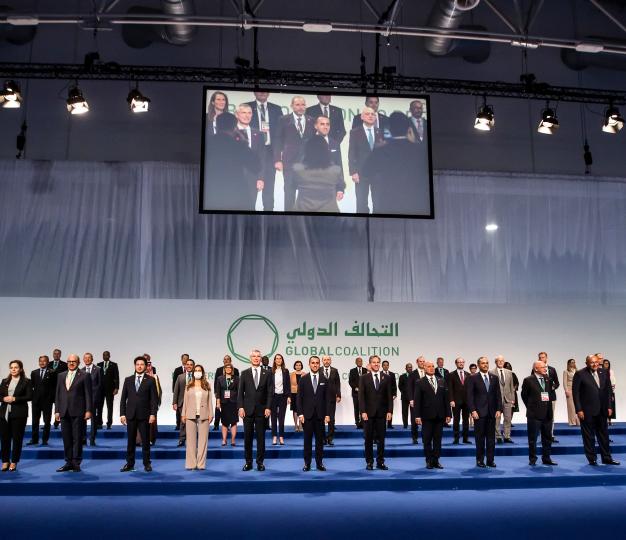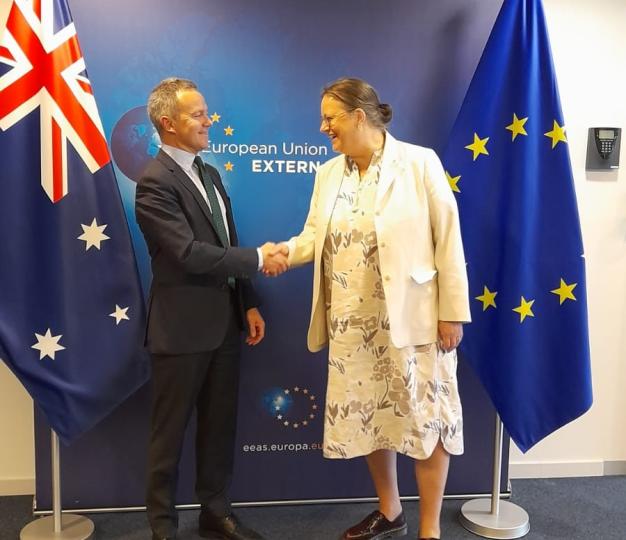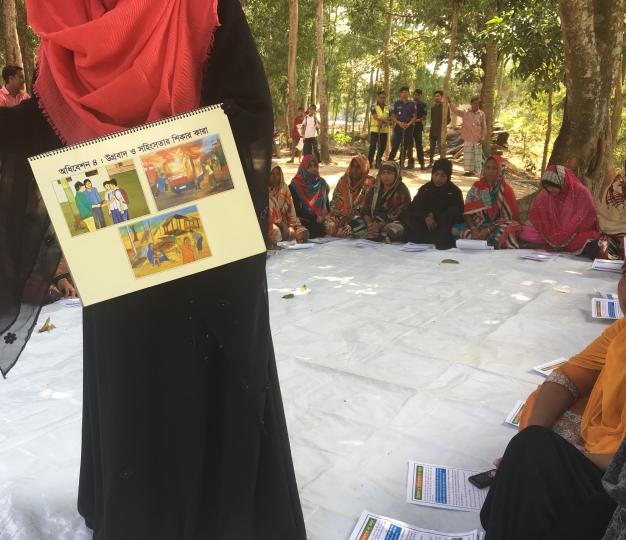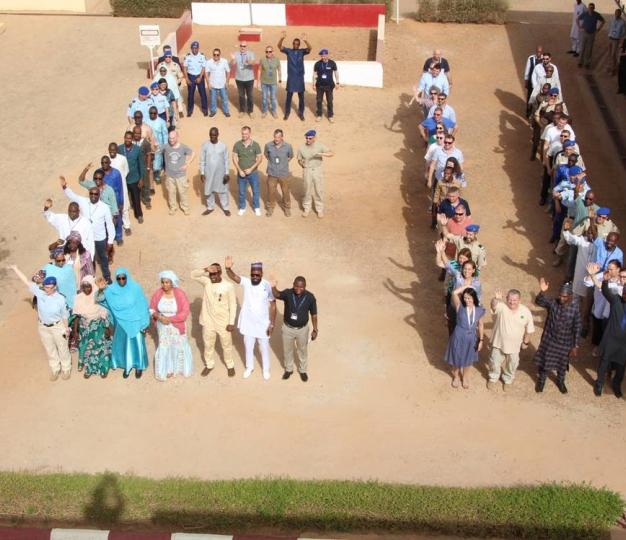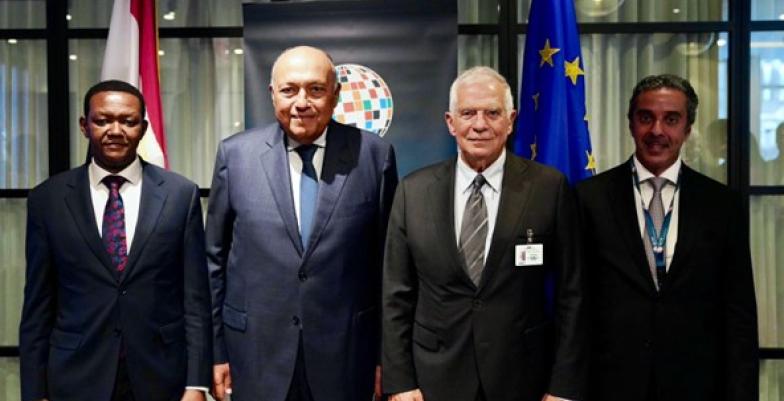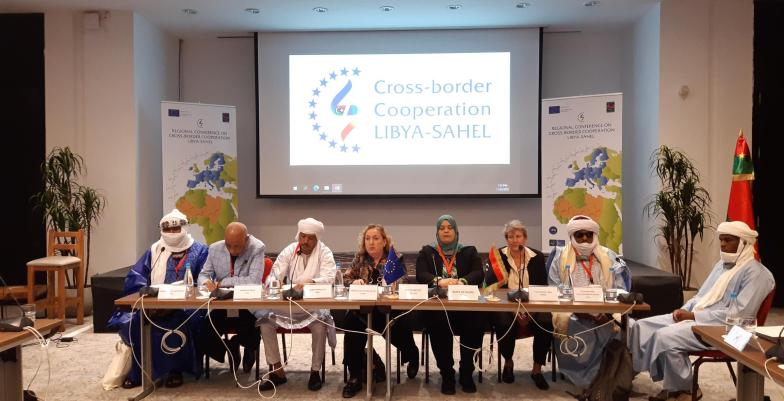Counter-terrorism
Terrorist attacks across the world show the extent of the unabated threat citizens face from all forms of violent extremism. The terrorist threat is diverse and geographically diffuse. It remains significant, complex, and unpredictable.
The challenges that demand action by the EU and its partners are numerous. Threats arise from the risk of radicalisation and violent extremism propagated in local communities within the EU and beyond, as well as the (re-) emergence of terrorist actors such as Al-Qaeda and Da'esh, and also low-key lone operators. Further, emerging technologies, an increasingly aggressive terrorist propaganda online, and politically-motivated terrorism are leading to new challenges.
To effectively counter and prevent the threat of terrorism and violent extremism, the EU takes a whole-of-society approach. This approach envisions a strong role for civil society actors and other non-governmental actors in ensuring effective prevention efforts that are based on human rights and respect for the rule of law.
The EU also prioritises gender-responsive counterterrorism (CT) and preventing/countering violent extremism (P/CVE) policies to ensure their effectiveness. This includes working with our partners on raising the number of women in law enforcement and increasing attention paid to the role of women and girls in CT and P/CVE policies.
The EEAS focuses first and foremost on the international dimension of counter-terrorism, in close coordination with EU Member States in the Council Working Party, COTER, and with all relevant EU institutions and international partners.
The role of the EEAS is to lead CT external outreach and guide EU capacity building assistance to third countries, in close cooperation with the other EU Institutions, to ensure coherence and efficiency.
Navigate the topic
Political framework
On 9 February 2015, the Council of the European Union adopted its first Conclusions on counter-terrorism. Since then, these have been developed in line with the evolution of the terrorist threat.
The latest Council conclusions on addressing the external dimension of a constantly evolving terrorist and violent extremist threat were adopted in June 2022. These Conclusions form the cornerstone of EU engagement in CT, alongside the EU’s 2005 Counter-Terrorism Strategy, the European Agenda on Security and the EU’s 2016 Global Strategy, which recalls that security at home depends on peace and stability beyond the EU’s borders.
The Strategic Compass approved in 2022, calls for the strengthening of our response to better prevent and counter terrorism by further developing the EU CT Toolbox, including our Common Security and Defence Policy (CSDP) instruments.
It calls for the stepping up of our engagement with strategic partners, including the UN and other multilateral fora, such as the Global Counter Terrorism Forum (GCTF) and the Global Coalition against Da’esh.
The European Commission’s EU Agenda on Counter-Terrorism (EU CT Agenda) strengthens the EU’s framework on anticipating threats and risks, preventing radicalisation and violent extremism, protecting people and infrastructures, and following-up after attacks.
Adopted in December 2020, the EU CT Agenda affirms that CT partnerships and close cooperation with countries in the EU’s neighbourhood are essential to improve security inside and outside the EU.
The EU works in full respect of internationally agreed norms and regulations. The UN’s Global Counter Terrorism Strategy (GCTS) and its Bi-Annual Review are key in this regard.
The EU plays an important role in coordinating the efforts of all of its 27 Member States during the negotiations in New York. The eighth review of the GCTS was finalised in June 2023 with the EU playing a critical role in ensuring that EU values continue to be reflected clearly and prominently in the updated strategy.
International partnerships
Multilateral cooperation lies at the core of the EU’s approach. To this end, the EU works closely with the UN, with the United Nations Office of Counter-Terrorism (UNOCT) and the Counter-Terrorism Committee Executive Directorate (UN CTED) in particular.
The EU also works with the 40+ UN entities which make up the UN Global Counter-Terrorism Coordination Compact.
Since September 2022, the EU has co-chaired the Global Counterterrorism Forum (GCTF). As a donor and member of their Governing Boards, the EU also contributes to the work of three institutions associated to the GCTF: Hedayah, the International Institute for Justice (IIJ), and the Global Community Engagement and Resilience Fund (GCERF).
The EU is also a non-military partner of the Global Coalition against Da’esh and engages actively with NATO, Interpol, the OSCE, and the Financial Action Task Force (FATF). It does so in order to share experiences and best practices and to voice EU values in the global debate.
Counter-Terrorism Dialogues
In recent years, the EU – led by the EEAS, with the close involvement of the EU Counter Terrorism Coordinator, the European Commission and the EU Justice and Home Affairs (JHA) Agencies – has established Counter-Terrorism Dialogues with key partner countries and multilateral organisations.
Political outreach through these specific CT Dialogues is held with a range of countries and institutions, including the UN, Australia, India, Pakistan, Saudi Arabia, Turkey, and the US.
The Counter-Terrorism/Security Experts’ Network
The EEAS manages the EU Counter Terrorism/Security Experts’ Network.
Established in 2015, the Network mirrors the geographic priorities of the EU’s external engagement on Counter-Terrorism (CT).
It currently comprises 20 Experts deployed in EU Delegations throughout the world. The Network is a key element of the EU’s CT Toolbox, as highlighted by the Strategic Compass.
The EU’s CT/Security Experts play a crucial role in liaising with host governments, regional organisations and civil society on behalf of the EU on the full range of EU CT and P/CVE activities with partner countries and organisations.
Capacity Building Programmes
The EU is one of the world’s most important providers of counter-terrorism capacity building and programmes aimed at preventing violent extremism. Such activities include preventing radicalisation and recruitment, both in prisons and outside, as well as strengthening resilience of young people and communities against violent extremism, promoting reintegration in local communities, and fighting against the financing of terrorism and money laundering.
As of January 2023, there are approximately €559 million of investments in CT or P/CVE-specific projects ongoing in countries outside the EU.
Other ways the EU combats terrorism
- EU Common Security and Defence Policy missions. The new Civilian Common Security and Defence Programme (CSDP) compact, approved in May 2023, highlights that it should contribute to increasing civilian CSDP’s effectiveness through efforts to strengthen the EU’s capacity to act rapidly and robustly, to secure host countries and civilian CSDP missions, to invest in more and better capabilities, and to partner with host countries as well as third states and international organisations. CSDP missions contribute to the EU's wider response to tackle current, emerging and future security challenges, including those linked to organised crime, terrorism, radicalisation and violent extremism. This is most apparent in relation to those missions with an explicit counter-terrorism mandate (EUCAP Sahel Niger, EUCAP Sahel Mali, EUBAM Libya, EUAM Iraq, EULEX Kosovo and EUTM Mozambique), but also applies to other missions that contribute to the countering of terrorism and prevention of violent extremism leading to terrorism in various ways, for example through security sector reform (SSR).
- Countering the financing of terrorism is a key element of the EU’s overall counter-terrorism strategy. In order to build and implement international standards, the EU works with its partners in the Financial Action Taskforce FATF - the international standard-setter for Anti-Money Laundering and Countering the Financing of Terrorism (AML/CFT). To ensure the protection of the internal market, the EU has established a process to identify high-risk third countries with strategic deficiencies in their AML/CFT regimes. As a part of its broader counter-terrorism engagement with partners, the EU coordinates approaches to AML/CFT and works with partner countries to support their AML/CFT efforts.
-
The use of traditional, online, and social media is a powerful instrument in the hands of terrorist groups all around the world. The efforts to oppose extremist narratives and undermine the appeal of its ideology are relentless. In that regard, the EU launched the EU Internet Forum in 2015 to provide a framework for an efficient cooperation with the internet industry in the future and to secure a commitment from the main actors to coordinate and scale up efforts in this area. The EU also supports efforts of the international community, including of the Global Coalition against Da’esh, the Christchurch Call and the Global Internet Forum to Counter Terrorism (GIFCT), to counter terrorist content and hate speech online.
-
The EU may also impose restrictive measures (sanctions) to target persons and groups involved in terrorist acts, including through asset freezes and travel bans. EU sanctions comply with obligations under international law, including international human rights and international humanitarian law. All efforts are made to avoid unintentional consequences of sanctions, on humanitarian activity for example.

